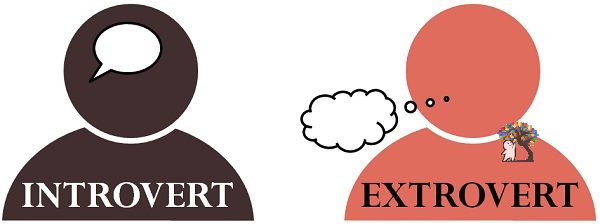8 things extraverts don’t get about introverts

Hey psych2goers, in this article we will be taking a look at 8 things extraverts tend to not understand about introverts. This text is of course only meant for educational purposes. There is nothing wrong with identifying as either an extravert or introvert. It can however be stated that extraverts and introverts have a tendency to behave differently in the same situation. This can be observed in a lot of things in life, one main one being the workspace.
In an article posted in the Huffington post, they reviewed introverts and extraverts in the workplace. Among other things it took a look at certain behaviors perpetually shown by both extraverts and introverts. Since extraverts and introverts are so different, it is good to have a better understanding of the other side which is what we will focus on today. So, without further ado, let’s get into the article.
Why do introverts tend to take longer to decide?
When introverts are faced with making a decision, they usually tend to take a bit longer to decide than an extravert. There is nothing wrong with this whatsoever, but it does pose the question: why is that? This exactly the question a group of researchers have asked themselves. They conducted a study into the topic and found that the reasoning behind it is quite simple. Making wrong decision puts you in the spotlight. Introverts will try to avoid that as it makes them feel uncomfortable. They, therefore, spend more time pondering their decision and weighing their options. There is nothing wrong with this, it only takes a bit longer.

It seems like introverts do not respond to change as well
In life, our situation is constantly changing even if we try to follow a routine, we are comfortable with. When this situation changes, we are faced with something we do not know yet. For introverts this is generally something they would like to avoid. Facing something new can be scary for everyone, but for a lot of introverts this behaviour is intensified. When you are met with the situation there is more pressure on you to act correctly and deal with it. This pressure, especially when there are on-lookers, makes it so introverts respond a tad differently to change than extraverts. Again, there is absolutely nothing wrong with that.

Why would someone only confide in a few people
Extraverts are very open people. They enjoy being in groups and talking to lots of people. They therefore confide in more people making it so that they have more options to talk about something with someone else. Being introverted makes it harder to talk to as many people as extraverts do, therefore introverts tend to be close with less people. This has the effect that they have less people they can confide/are comfortable with confiding in. This seems odd to extraverts as they prefer to talk with more people. Again, we would like to stress that there is nothing wrong with this. So, in short, introverts confide in less people because they tend to be close to less people due to introversion which is completely fine.
How do you keep focused for so long?
The Huffington post article mentioned in the beginning of this text also made some findings regarding how long extraverts and introverts can focus. They found that introverts tend to have an advantage here. In every workplace the Huffington post looked at for their article this was the case. It is due to the following reason: introverts are, from time to time, more on edge than extraverts. The workplace is quite a social environment in a lot of companies. Extraverts are more at ease here simply because they are more comfortable talking to a lot of people. When you are in an environment you are comfortable in: you lose your focus more quickly. This explains why introverts have a better time focusing for long periods of time. In short, due to extraverts being more comfortable in social situations like the workplace, they tend to lose their focus more quickly in an environment with a lot of social interaction because it puts them at ease. The opposite is true for most introverts.
How come introverts seem to not enjoy praise as much?
In life we receive praise, it is a relatively regular part of it. Getting praised for something is a joyful experience for us. So why do introverts sometimes seem to not enjoy the praise they receive? This is because getting praised puts you in the spotlight. You are suddenly the topic of conversation making it so, that all the attention is focused on you. Introverts do not enjoy that. Even though they might appreciate the praise it can be difficult for them to react to it. They are simply more averse of being put in the spotlight in a social situation. Praising introverts is not something you should avoid though, by no means; they deserve just as much praise as extraverts. Just maybe think about doing it in an environment they are comfortable in, without so many people focusing their attention on them.
Why does it seem like introverts speak less?
Like we explained in the previous paragraph, introverts do not wish to be in the spotlight in a social situation they are uncomfortable in. This explains another thing extraverts tend to notice about introverts. A large part of introverts speak less to avoid being in the spotlight, it is as simple as that. While they might speak less, they should still be listened to! If you spot an introvert is uncomfortable while speaking to a group for example, just listen to them. All they want is to avoid a big fuss and have the groups attention turn even more to them. They maybe speak less but this does not devaluate their message. It may come off averse to an extravert, but, remember, you have a different understanding of what’s comfortable in a social situation. So, don’t make them feel bad about speaking a bit less. We are all equal after all.

Why do introverts sometimes fall silent in group conversations?
Being in a group is, generally speaking, something great for an extravert as they enjoy all the social interaction. For an introvert, this is, usually, not the case. Being in/interacting with a group puts the spotlight on someone when they speak. This is something introverts will want to avoid if they are uncomfortable in the social situation. Subsequently, this can result in them withdrawing a little and falling silent. Don’t take offence, they do not mean anything bad by it. It is important that it is not addressed as, otherwise, someone might become uncomfortable. If you see an introvert withdraw a bit from the group, it may help to have a small one-on-one conversation. This allows them to have a social interaction they are more comfortable with and be more at ease in the group afterward.

It seems like introverts have a smaller friend group, why?
Overall, introverts have the tendency to have smaller friend groups than their extraverted counter parts. This is due to a lot of stuff we have already covered in this article. It may seem weird to an extravert: wouldn’t you want as many friends as possible? Introverts sometimes struggle in social situations resulting in them knowing less people and therefore having less big friend groups. It must be noted though that introverts have much stronger bonds with their friend groups than extraverts.
So, it may seem weird, but it is just the way introverts are comfortable. Since they have less people to spend time with, they spend more time with the friend group they do have, strengthening their bond. It does not mean they are weird; it just shows that they are more comfortable with less people around. This was the last point we wanted to raise. Below you will find a recap of the text and a list of information and sources. Let us know what you thought in the comments, we would really appreciate it.

Let’s take a quick look back at the text and the most important information; Introverts do not like the attention turning to them in a social situation they are not comfortable in. Introverts have a different standard all together for what constitutes as a social situation their comfortable in than extraverts. This makes them behave differently than what extraverts would expect of them. Resulting in common misunderstandings which this text aimed to help clarify. We hope that you enjoyed reading it and are now more aware of 8 things extraverts tend to not understand about introverts. Let us know what you think in the comments!
Sources:
https://www.huffingtonpost.com/entry/difference-between-introverts-extroverts-chart_us_57f794c2e4b0b6a430316b3a
Newcomb, T. M. (1929). The consistency of certain extrovert-introvert behavior patterns in 51 problem boys. Teachers College Contributions to Education
https://www.eharmony.com.au/dating-advice/blog/do-introvertextrovert-relationships-work#0SLk05vkP3bXSE
Wysocki, B. A. (1957). Differentiation between introvert-extravert types by Rorschach method as compared with other methods. The Journal of Psychology, 43(1), 41-46.






Responses